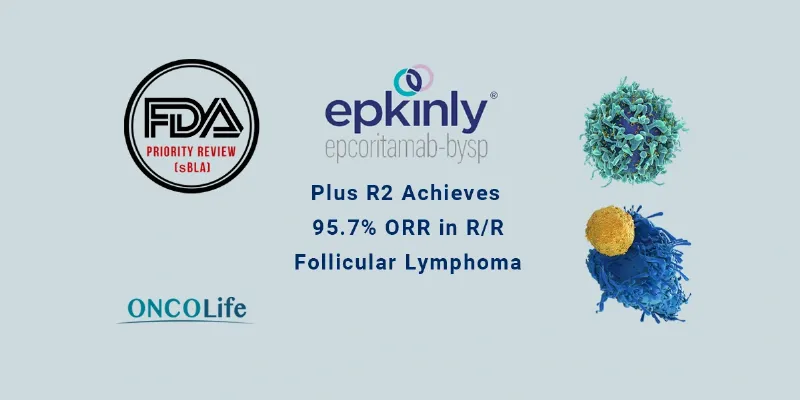Epcoritamab + R2 Achieves 95.7% ORR, Cuts Risk by 79% in R/R Follicular Lymphoma

8 August 2025
The FDA has granted priority review for the epcoritamab combination, with potential approval making it the first bispecific antibody regimen for second-line follicular lymphoma treatment. In the Phase 3 EPCORE® FL-1 trial, epcoritamab plus rituximab and lenalidomide (R2) significantly outperformed R2 alone, achieving a 95.7% overall response rate and reducing the risk of progression or death by 79%.
Genmab has announced that the Phase 3 EPCORE® FL-1 trial met both of its primary endpoints, demonstrating that subcutaneous epcoritamab (Epkinly) in combination with rituximab and lenalidomide (R2) delivered superior outcomes compared to R2 alone in patients with relapsed or refractory (R/R) follicular lymphoma (FL).
In the interim analysis, the combination achieved a 95.7% overall response rate (ORR) (p < 0.0001) and a 79% reduction in the risk of disease progression or death (hazard ratio [HR] 0.21; p < 0.0001) versus R2 alone. Both improvements were statistically significant and clinically meaningful, underscoring the potential for epcoritamab plus R2 to become a new second-line standard in R/R FL.
The findings, which will be presented at the 67th Annual Meeting of the American Society of Hematology (ASH), form the basis of global regulatory submissions. In the U.S., the FDA has accepted a supplemental Biologics License Application (sBLA) for priority review, with a target action date of November 30, 2025. If approved, this would mark the first bispecific antibody combination regimen available in the second-line setting for FL.
“While therapeutic options exist for patients with relapsed or refractory follicular lymphoma, response rates tend to decline and durability diminishes with each subsequent line of treatment, which can increase the risk of the disease transforming into aggressive large-cell lymphoma,” said Jan van de Winkel, Ph.D., Chief Executive Officer of Genmab. “The results from this trial, and the decision from the FDA to accept the sBLA for priority review, demonstrate the potential of this epcoritamab combination therapy to reshape the treatment landscape.”
Safety Profile
Epcoritamab plus R2 showed a safety profile consistent with each agent’s known effects, with no new safety signals identified. Single-agent epcoritamab already holds accelerated FDA approval for R/R FL after at least two prior systemic therapies, and the combination has been granted Breakthrough Therapy Designation for use after one prior line.
Follicular lymphoma, an indolent B-cell non-Hodgkin’s lymphoma, represents 20–30% of NHL cases, with roughly 15,000 new U.S. cases annually. While treatable, it remains incurable, and many patients relapse. Over time, more than a quarter of cases transform into diffuse large B-cell lymphoma (DLBCL), a more aggressive form with poorer prognosis.
The EPCORE FL-1 trial (NCT05409066) is an open-label, Phase 3 study comparing epcoritamab plus R2 with R2 alone. Dual primary endpoints were independently assessed ORR and PFS, using Lugano criteria.
With the EPCORE FL-1 results, Genmab and AbbVie are positioning epcoritamab combinations as potential backbone therapies across B-cell malignancies, with ongoing regulatory filings worldwide.
About Epcoritamab
Epcoritamab is a subcutaneous IgG1 bispecific antibody developed with Genmab’s DuoBody® technology, designed to bind CD3 on T cells and CD20 on B cells, inducing targeted T-cell–mediated killing of malignant B cells. Marketed as EPKINLY® in the U.S./Japan and TEPKINLY® in the EU, it is co-developed by Genmab and AbbVie, with shared commercialization responsibilities. Approved for certain lymphoma indications, epcoritamab is under investigation as monotherapy and in combinations across hematologic malignancies. Five Phase 3 trials are ongoing in R/R and newly diagnosed DLBCL, as well as R/R and untreated FL. Safety and efficacy for these investigational uses remain unestablished.











Comments
No Comments Yet!